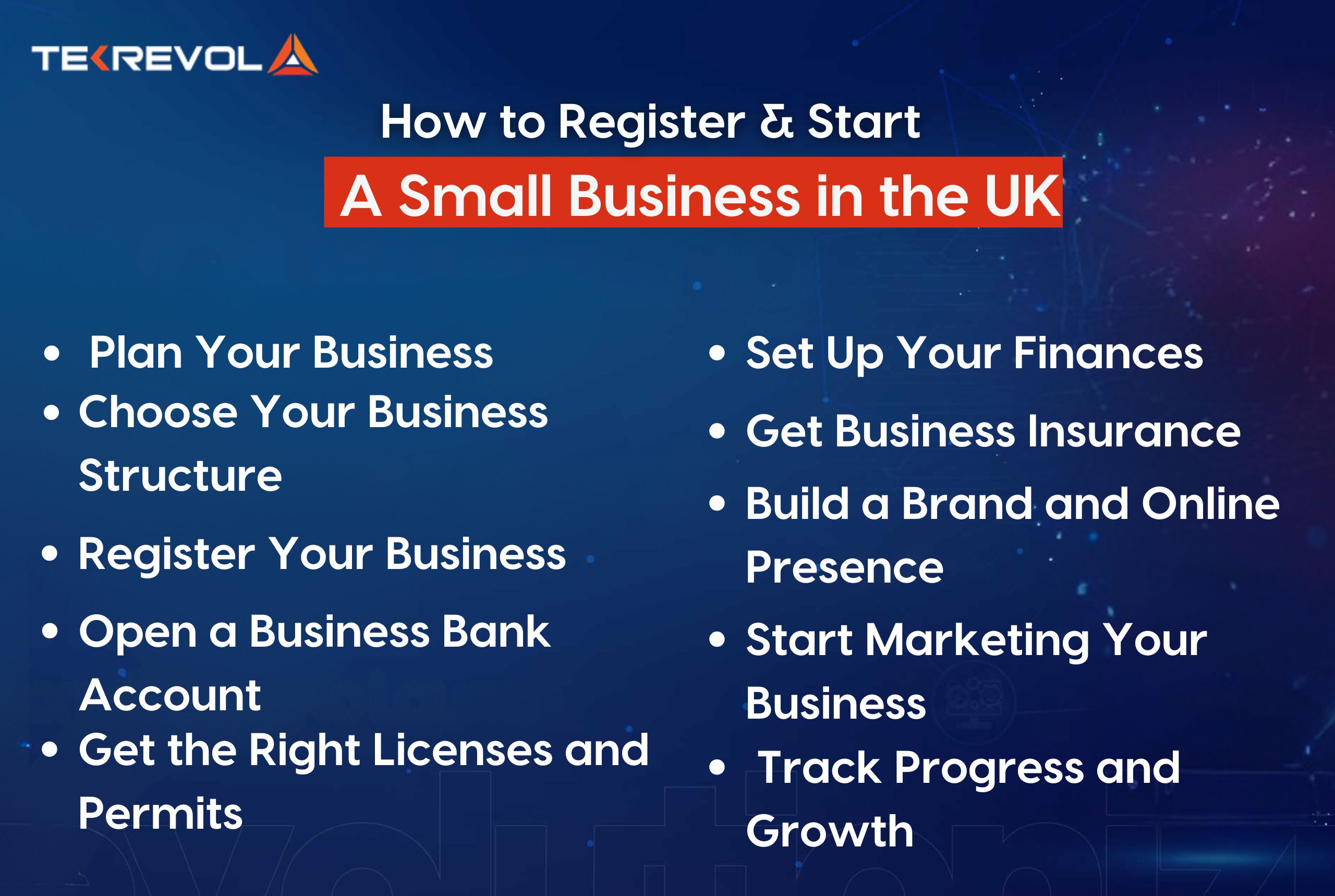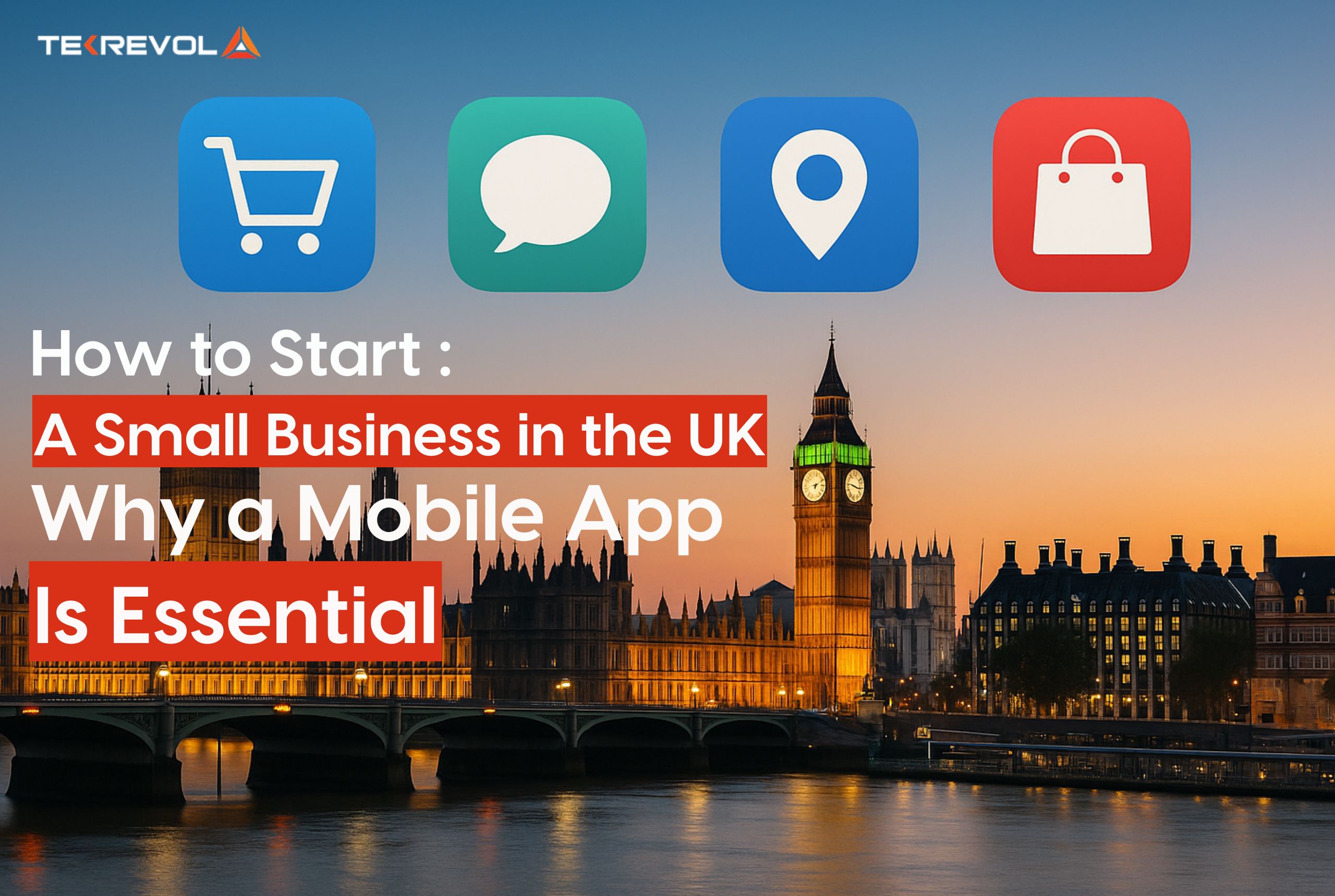Thinking about running your own little venture? Starting a small business in the UK can feel like scaling a mountain, with all the details to juggle. But here’s the thing: these days, one tool stands out as essential rather than optional: a well-built mobile app.
Did you know that 88% of UK adults have a smartphone, and they spend over 90% of their mobile time on apps, not browsers? That’s a massive chance for small businesses to jump in. Apps aren’t just for the big players anymore, they’re a smart, scalable way to grow loyalty, drive engagement, and boost sales from day one.
In this blog, we’ll dive into why having a mobile app is such a game-changer for new businesses and how to start a business using the app.
What Do You Need to Start A Business? Entrepreneurship in the UK
Small and medium-sized enterprises (SMES) are not only players in the economy; they are the backbone. With 99.9% of all businesses in the UK constituted by SMES, these enterprises employ more than 16 million people and generate a whopping £2 trillion commercial turnover per annum. This figure underpins how essential small businesses are to the country’s economic health, innovation, and job creation.
Despite challenges like rising inflation, legislative changes from Brexit, and post-pandemic recovery, the UK entrepreneurial ecosystem remains incredibly vibrant.
Government statistics indicate that over 800,000 new businesses were registered in 2023. The resulting surge in startup activity is a testament to the resiliency and progressive outlook that continue to shape the future of the UK.
Today, small businesses are not just filling in local market gaps, and they are intentionally adopting digital tools, harnessing eCommerce, and opening up new opportunities in various sectors: tech, retail, health, and sustainability.
The Rise of eCommerce in UK: From Optional to Essential
Over the past decade, and especially since the COVID-19 pandemic, eCommerce has grown from a convenient add-on to a core business model. According to Statista, over 80% of UK consumers now shop online, and the UK ranks as the third-largest eCommerce market globally.
For small businesses, this shift means one thing: adapt or get left behind.
Here’s why eCommerce is no longer optional:
- Limited Reach: A brick-and-mortar shop is limited by geography. With an eCommerce store, your national potential customer base can become clientele all over the world.
- Lower Costs: Without the need for rent, utilities, and personnel costs related to an in-store presence, online sales significantly decrease business operation expenses.
- Customer Insights: eCommerce enables real-time access to customer behaviour, sales trends, and inventory performance for a business.
- Sales 24/7: Your online store never sleeps, allowing sales at any hour.
Why a Mobile App Is Essential for Modern UK Businesses
Let’s face it, today, if your business doesn’t have an app, it’s starting to feel a little behind the times. With so much of our lives happening on our phones, UK businesses need to meet consumers where they already are. In this section, we’ll dive into why a mobile app is crucial for staying ahead in the game.
-
Digital-First Consumer Behaviour in the UK
Mobile usage stats and trends
Did you know that more than 90% of adults in the UK own a smartphone? Crazy, right? And it’s not just for texting or scrolling through social media. People are spending more and more time on apps, around 4 hours a day! So, if your business isn’t on someone’s phone, you might be missing out.
How consumers interact with businesses via apps
People rely on apps daily for various purposes including shopping and booking services and conducting online food orders. The system operates fast while requiring minimal steps through a user-friendly interface. Without an app your customers feel unsure about your presence through the lack of digital access. Your customers can connect more easily through an app thus building better relationships and higher engagement rates.
-
Enhanced Customer Engagement
Push notifications for offers and updates.
One of the coolest things about mobile apps is the ability to send push notifications directly to your customers. Want to let them know about a special offer? Or remind them about a cart they left behind? Push notifications are a great way to keep your business top of mind without being too pushy.
In-app loyalty programs
People love rewards, right? Applications serve as excellent platforms to develop loyalty programs. Within the app your customers can effortlessly experience rewards such as price cuts along with purchase points and particular deal benefits that will create a sense of uniqueness and drive ongoing customer loyalty.
-
Competitive Advantage
How Small Businesses Can Stand Apart From Big Competitors
The question lingers whether small businesses truly require their own applications since big corporations seem to dominate the app market. A mobile application enables small businesses to compete against big companies through user-friendly platforms that deliver convenience to customers. And trust us, your customers will take note.
Smoothing Out the Scale Between Big Brands
It’s not just about size. An app helps smooth out the playing field. Whether you are a local cafe or a boutique shop, having an app lets you engage customers just as well as, if not better than, the big guys do. This is a sure way to demonstrate that you are contemporary, professional, and customer-centric.
-
Operational Efficiency
Booking, ordering, and payment systems
If servicing a business involves a lot of logistics, then the app is going to make life easy for your customers by enabling them to book appointments, order products, and even pay for their service all in one place. It’s all automated, so you don’t have to worry about double bookings or missed orders.
Reduced Manual Workloads and Human Error
Whenever there is manual intervention, errors are bound to happen-and the app helps in solving this with its speed and convenience. For example, when you have an app, it could automatically update your inventories, track your customers’ orders, and remind you of some important tasks.
How to Register and Start a Small Business in the UK

Commencing a small business in the United Kingdom appears thrilling at first until one realises how complex the process can be when deciding where to start. Here we explain how to execute this process through simple defined actions which will help you.
Step 1: Plan Your Business
Before diving into anything, it’s important to create a clear business plan. This serves as a roadmap steering the user to outlining goals, defining a target audience, setting realistic financial expectations, and much more. This is also very much required in case funds or loans need to be applied for.
Key things that must be included in your plan:
- Business Overview: What will your business do, and what makes it different from others?
- Market Research: Who are your competitors, and how will you stand out?
- Sales & Marketing Strategy: How will you attract customers and grow your business?
- Financial Forecasts: What are your projected costs, revenue, and profits?
Step 2: Choose Your Business Structure
In the UK, the very first decision one has to make is about choosing a business structure. It defines how the business will be taxed and how much personal liability an individual has.
Your options are:
- Sole Trader: The simplest option is becoming a sole trader- you own the business. You keep all the profit, but are personally liable for debts.
- Partnership: If you are starting a business with someone else, a partnership is an option. You share responsibilities with your partner and divide profits, but both are personally liable for debts incurred by the business.
- Limited Company: A limited company protects your personal assets. Company finances are borrowed or separate from your finances, but they are much more complex. It relates to additional administrative burdens that accompany forming a limited company.
Step 3: Register Your Business
Once you complete the business plan and the company structure, this becomes your business’s official registration. The registration depends on the business structure you select.
For sole trader: You will need to register for self-assessment tax purposes with HMRC.
Partnership: if it is a partnership, then it will have to register with HMRC, and each partner will be required to submit self-assessment tax returns.
Limited company: It will be registered with Companies House, and to run a limited company legally, all obligations in compliance with the law will have to be met, including filing annual financial statements.
Step 4: Open a Business Bank Account
Having an entirely separate bank account for business purposes is important to maintain the distinction between personal and business financial matters. If your registration is as a limited company, having a separate bank account is a legal requirement.
Select the right bank for your needs, one that is small-business friendly. Most banks offer applicant-friendly business account options that feature low fees, solid online banking systems, and business advice tailored to new businesses.
Step 5: Get the Right Licenses and Permits
Depending on the type of business entity, different business licenses or permits may be required for legal proceedings in the UK. Specific permits may be required for food businesses, childcare, or home-based businesses.
Confirm on the Gov.UK website if any license applies to your business and obtain it before starting the operations.
Step 6: Set Up Your Finances
Keeping records from the very start is best. An accounting system should assist you with invoices, expenses, and tax matters.
You also need to learn the tax obligations you have to meet:
- For sole practitioners and partnerships: Income tax and National Insurance contributions are calculated based on the profits assessed.
- Limited companies: These companies pay Corporation Tax on the profits of the company, as well as income tax as a director on the same profits, if they draw a salary.
If you feel confused about taking care of finances or taxes alone, get an accountant.
Step 7: Get Business Insurance
You’ll need the correct insurance types to protect your business and personal assets. Each type of business requires different insurance protection:
- Public Liability Insurance: Liability insurance protects you from injury to a person or damage to property brought about by your business activities.
- Employer Liability Insurance: This is a legal requirement if you have any employees.
- Professional Indemnity Insurance: Insurance that protects you in case a client claims substandard service from your side.
Insurance should also be considered to protect your finances if you are a sole trader working from home.
Step 8: Build a Brand and Online Presence
An absolutely important thing for a person living in this digital world is a strong online presence, which allows the customer to find you, know your services, and step up for a brand engagement.
Points to consider:
Establish an App: Having a simple one is better than not having one at all. Ensure that it offers easy navigation and describes in detail what your business is all about.
Social media profiles: A perfect means to raise awareness of the brand and connect with potential consumers.
Create a logo and other elements of your brand: The identity of your brand should be applied consistently to your app, social media, and marketing.
Step 9: Start Marketing Your Business
Now you have a business set up, and it’s time to get the word out. Here are a few ways you can get started marketing:
- Local Advertising: Use flyers, local magazines, and community events to help get the word out. Parent:
- Online Advertising: a nice way for getting direct targeted traffic by pay-per-click ads, Facebook ads, and also Google ads.
- SEO (Search Engine Optimisation): Optimise your site for services so that your site comes up when someone searches for it.
Think about special promotions, discounts, or trials to attract these first customers. Private referrals at this early stage can become your prime asset.
Step 10: Track Progress and Growth
Opening a small business is the beginning. You need to track your progress, see what works over time, and refine your approach. This might include altering marketing, increasing product or service lines, and possibly hiring more personnel as demand increases.
Business success requires continuous monitoring of market trends and customer requirements to maintain innovation and adaptations of business models.
How Small Businesses Can Get the Most Out of Mobile Apps
The real strength of mobile applications enables businesses to reach operational excellence while boosting productivity and delivering exceptional user experiences. Small businesses can efficiently harness the total capability of mobile apps by implementing these effective practices.
1. Start With a Mobile-First Mindset
Think of mobile not as an add-on, but as the foundation of your digital strategy. A mobile-first strategy means that the team can access critical tools and data on a mobile device, thereby helping employees work efficiently and make quick decisions regardless of their location.
2. Use Unified Platforms
It’s all about consistency. Using the same set of apps across your organisation reduces confusion, minimises training time, and makes collaboration easier. It also safeguards you from paying for overlapping tools with the same purpose.
3. Focus on Core Needs
Pick apps that solve your problems- scheduling, communicating, sharing files, or customer management-related. Focusing on solving these problems rather than trends will ensure that you get a good return on your app investment.
4. Protect Your Data
There is no compromise when it comes to data security. Following the best practices, choose applications that provide security features for safeguarding sensitive business and customer information from being compromised. Some examples are password protection, encryption, and multi-factor authentication.
5. Review and Optimise Regularly
Make it a regular practice to assess the usefulness and usage of your applications. This will reveal app redundancies, tools that should be eliminated due to lack of use, and alternatives better suited to the company’s evolving needs. Through this process, you keep your digital ecosystem lean, cost-effective, and current.
Launch Your Startup App Faster with TekRevol
Starting a business is a thrilling and rewarding endeavour. However, it can greatly drain a person who has not been guided and equipped with the right resources. Being a leading app development company in the UK, we offer guidance on how to make your startup run fast from the ground up. Our exceptional app development expertise and knowledge within the startup ecosystem offer entrepreneurs like you the tools to realise business ideas faster and more effectively.
If you’re looking for a guide on how to start a business venturing forward, TekRevol can really offer the technological expertise and strategic support you need to make the dream happen. From app development to building solid online presences, we’ve got you covered through every step of the process.
- Looking to build a successful mobile app for your business?
- We help entrepreneurs in the UK bring their app ideas to life with innovative solutions.

 31 Views
31 Views April 25, 2025
April 25, 2025








